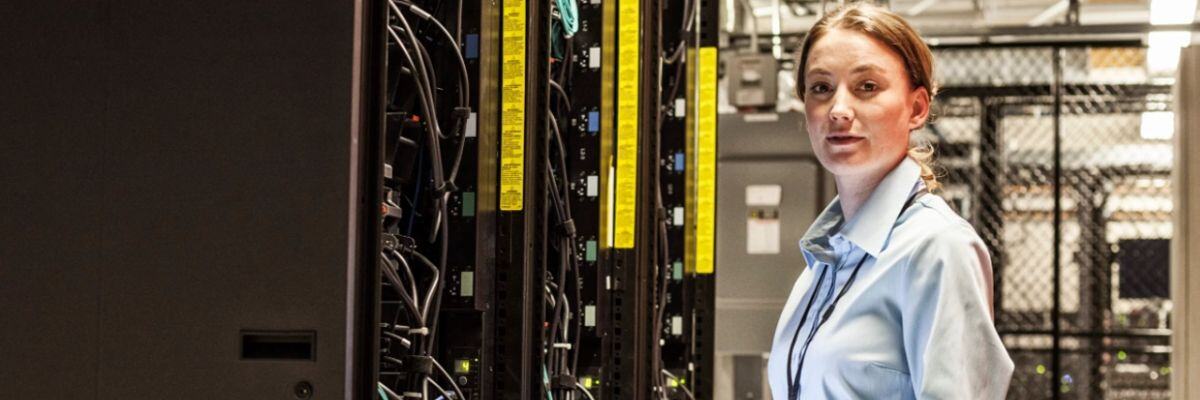
Servers are in every facet of modern life, yet not many people know what they are. Here are six things you probably need to know if you are thinking about getting one for your business.
Coming into the IT service management business, I realized how little I actually knew about servers in general. Being the nosy parker, I dived into Google and made my search. All I wanted was to find out what type of servers a business owner might need, and I was confronted by a whole lot of information about Discord servers and Minecraft servers I did not want.
After much kerfuffle, I teased out the precious grains of non-techie stuff I could understand and laid them out for the benefit of anyone who wants to know and is as clueless as I was when I first started on this journey. Here is what I found out, and you’re welcome.
What is a server?
A server handles requests made by a group of connected devices (or networks) called clients. The server could be software such as a web server that hosts websites or an actual physical device (hardware) that looks a lot like a desktop CPU (and actually could be one). The network could be a closed connection between internal clients such as a local area network, or a wide area network.
For example, if you use Office 365 or Microsoft Teams in your business for email communications and internal communications, that is an example of a software server over the Internet. If you use Windows File Server, it is also a software server, but it only goes through your local area network and not the Internet. In either case, whoever is sending and receiving messages are the client.
How much does a server cost?
What is the role of the server?
You can think of a software server as a waiter in a restaurant. The guest asks for a steak, the waiter processes the order by giving it to the kitchen, and the kitchen sends the steak to the guest via the waiter. The waiter has access to both the guest and the kitchen and manages the flow of information to ensure a smooth transaction. In most cases, the waiter also manages the information flow between the guest and the cashier.
Servers do the same thing. They can be set up to perform a single function (dedicated servers), e.g. process emails, or multiple ones (shared servers), e.g. host one or more websites and send/receive emails.
Servers are usually always on because shutting them down will halt all transactions between clients, and that can be a big problem for the users. This is also the reason for having redundant servers in case one fails or shuts down for some reason.
What are the types of servers?

The funny thing is a few years ago I did set up a network server for a friend who had a small business. He had about 5 computers, and one was really old and slow, so I decided to use the hard disk for storage and file-sharing! Knowing what I know now, this is not recommended!
Back then, though, I thought I was the bee’s knees. I don’t remember how I did it, but I know I didn’t use any third-party software such as FreeNAS because it didn’t exist, but you can certainly repurpose an old computer as network-attached storage (NAS) using that now. Just remember that anything you put in there could be gone in an instant without a proper backup system. Those are the breaks.
What I didn’t know then, and just found out now is that there are many different types of servers. Here are a few you might want to know.
-
Application Server
Hosts and runs any type of application from a central location typical for the most line of business applications - Blade Server
Trimmed down version of a regular server designed to save space by multiple servers sharing one chassis that supplies the power; the purpose is to increase computing power without taking up a lot of space - Virtual Server
A physical server for processing and storing information that uses virtualization software to divide one server into multiple servers - Cloud Server
Typically multiple servers designed to host information not on local hardware - Database server
Stores, manages, and retrieves information from databases using software such as Microsoft SQL Server - Dedicated Server
For the exclusive use of one user or organization; no sharing! - DNS or Domain Name Service
A type of database server, but exclusive for storing domain names, much like a phonebook for the Internet - File Server
A central place to store files that any authorized user or client can access - Mail Server
You guessed it – software that processes emails; common servers of this type include Microsoft Exchange Server or Office365 - Print Server
Local or online software that queues print requests - Proxy Server
Software that controls access to and from a website, much like a gatekeeper, mostly to ensure the security of the clients - Standalone Server
The server used to authenticate users and control access to assets within a local area network - Web Server
A physical server that runs software to store, process, and deliver web pages to the users
How do servers connect to clients?

There are typically two ways for clients to connect with a server: locally and online. Local connections are through local area networks (LAN) and can only be accessed onsite. Online connections go through the Internet, typically using a registered domain name.
If you think I’m stating the obvious, let me tell you about an interesting thing I learned from ITS CEO Tom Andrulis. There is such a thing as a point-to-point connection, where a business will run a private and dedicated line to a server in an offsite location. Technically, that qualifies as a WAN (Wide Area Network) and it can be extremely fast (depending on the price), extremely secure, and typically extremely expensive.
The point is servers provide access to clients to whatever service or feature for which they sign up, and clients, in turn, can customize access to their servers to others. This is critical for doing business even if you are only doing internal stuff or online for remote work and selling.
Where do servers live?
If you are using servers for business, then they can be both on-site and off-site. Onsite (on-premise) servers should be in a secure and protected environment, preferably climate-controlled, because you don’t want unauthorized people to have access to them and since they are always running, you will want to keep the hardware from either overheating or freezing.
Servers housed (if you own them) or hosted (if you don’t) in a data center are under the management of the data center, so you will not have to worry about keeping them in good shape. You save on the upkeep and hassle for a relatively low fee. In many cases, leasing “rack space” for your server can cost as little as $300 a month. If you rent a server instead of buying one, you save on upfront costs but be sure that your data and applications are backed by redundant servers in case of failure.
Of course, leasing server space does come with a monthly access fee, typically billed for how much computer and storage is needed. However, you won’t have to worry about data loss nor depreciation of your hardware. You can also choose to increase your access and server space as needed.
Is a server necessary?
Now that you know a little bit about servers, you probably realized that it figures in a lot of activities you do every day. The question is if you need to buy your server or lease one.
That depends on your data access and processing needs. If you run a solo practice as a dentist, you’re probably running one local. However, if you have a lot of data and/or applications that multiple people need to access at any given time, then you probably need some type of server in your life.
If you are lucky and your data-driven business is growing rapidly, then I would suggest researching IT management service providers. You are going to need one, and you don't really want to wait until you do.
Topics:
